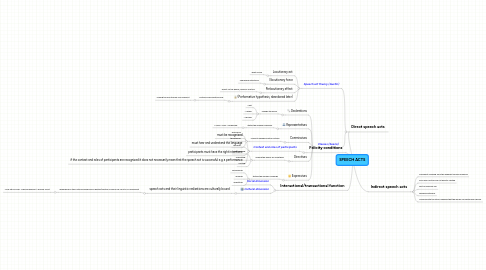
1. Felicity conditions
1.1. Context and roles of participants
1.1.1. must be recognized
1.1.2. must hear and understand the language
1.1.3. participants must have the right intentions
1.1.4. if the context and roles of participants are recognized it does not necessarily mean that the speech act is successful e.g. a performance
2. Interactional/transactional function
2.1. Social dimension
2.2. Cultural dimension
2.2.1. speech acts and their linguistic realisations are culturally bound
2.2.1.1. depending on the cultural background a gesture/custom could be an insult or a compliment
2.2.1.1.1. 'How fat you are!' -India:compliment -Europe: insult
3. Direct speech acts
3.1. Speech act theory (Austin)
3.1.1. Locutionary act
3.1.1.1. 'what is said'
3.1.2. Illocutionary force
3.1.2.1. 'expressing intentions'
3.1.3. Perlocutionary effect
3.1.3.1. 'effect on the hearer, hearer's reaction'
3.1.4. (Performative hypothesis, abandoned later)
3.1.4.1. contains 'performative verb'
3.1.4.1.1. making the illocutionary force explicit
3.2. Classes (Searle)
3.2.1. Declarations
3.2.1.1. change the world
3.2.1.1.1. 'I bet'
3.2.1.1.2. 'I resign'
3.2.1.1.3. 'I declare'
3.2.2. Representatives
3.2.2.1. states the speaker's believes
3.2.2.1.1. 'I came; I saw; I conquered'
3.2.3. Commissives
3.2.3.1. commits speaker's future actions
3.2.3.1.1. 'promising'
3.2.3.1.2. 'threatening'
3.2.3.1.3. 'refusing'
3.2.4. Directives
3.2.4.1. making the hearer do something
3.2.4.1.1. 'commanding'
3.2.4.1.2. 'requesting'
3.2.4.1.3. 'inviting'
3.2.5. Expressives
3.2.5.1. stating the speaker's feelings
3.2.5.1.1. 'apologising'
3.2.5.1.2. 'praising'
3.2.5.1.3. 'regretting'
